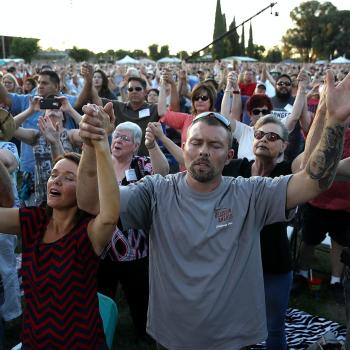1) An Awareness of Faith Identity Construction. Just as the United States has defined itself in the past by way of what it is opposed to, formerly Communism and now the War on Terror, so too Evangelicals (hearkening back to the Fundamentalist-Modernist controversies of the early 20th century) tend to define their faith identity by way of opposition, including hostility toward those in other religions.
2) Attentiveness to Self-Fulfilling Prophecies. It is often the case that we go to war with those we fear. Unfortunately, there are times in our lives when we lash out at those we feel threatened by, preempting a strike against them, even if they have not instigated a fight or challenged us. It should come as no surprise that when we fear the religious other, the religious other will often come to fear us. We should be attentive to this dynamic and seek to guard against projection. Fixating on destructive myths involving monsters will own lead to them becoming reality.
3) Admonition to Bearing True Witness. Given Evangelicalism's commitment to truth, it is troubling that many of our popular depictions of other religions are so filled with misrepresentations and involve our selection of and focus on the most unflattering aspects of these traditions possible. In so doing we risk being unfaithful to God's desire that we not bear false witness against our neighbors (Ex. 20:16; Mt. 19:18). Moreover, we risk the same thing happening to us: if we engage in false witness concerning the "religious other," we should not expect that they will reflect upon us in the most favorable light. Those who live by the monstrous mythmaking sword will die by that sword at the hands of their own monsters.
4) Aspirations for a Third Way. Our call to move beyond objectification of religious others and the transformation of them into monsters of faith should not be taken to suggest compromise, but rather clarification and even collaboration with them wherever possible. We are not calling for the abandonment of our Evangelical distinctiveness or declaring that there is no difference between Evangelicals and others, including Mormons, Muslims, and Pagans. We do share things in common, but of course, there are many important differences, especially convictions centering on the person and work of Jesus Christ. Still, we need to develop and maintain strong faith identities, which do not depend upon the existence of monstrous others by way of opposition. This is the model we are pursuing at the Evangelical Chapter of the Foundation for Religious Diplomacy with a growing network of Evangelicals that maintains a balance between fair understanding and civil engagement, without compromise to our or another's religious convictions. A religious movement that is reactionary rather than proactive is never healthy. In fact, it is often spiritually paranoid. We should not prejudge or look for weaknesses in the various traditions that Christians encounter so as to deconstruct and destroy them, but rather seek to understand them on their own terms, looking for common ground, and attending to important differences between our traditions whenever we come upon them.
If we Evangelicals do not want to be viewed as monsters of faith, if we want to be known for what we are for rather than what we are against, if we want to win the religious other over as a friend and even by God's grace to orthodox faith in Jesus Christ, as God so leads and with no trickery involved, we need to make sure we are not trying to slay the religious dragons of our own creations. Our battle is not with flesh and blood (Eph. 6:12), but with the Great Dragon (Rev. 12:9). Certainly, that Dragon deceives and leads people and movements astray. Yes, we need to be discerning and not allow him to take us captive as well and lead us away from the truth of Jesus Christ revealed in the Bible. We also need to be discerning by not allowing his cunning to lead us to lead other Evangelicals astray from understanding those of other faith paths in our midst for who they truly are, and not the monsters we might otherwise create them to be. Misunderstanding, distrust, and hate never bears witness to our Lord. Let's not demonize those religious others who are our neighbors.
This Halloween Season, let's move beyond threats and nasty tricks, and treat the religious others in our midst as neighbors, approaching them as we would want to be treated.




